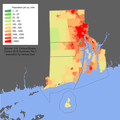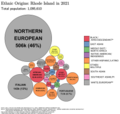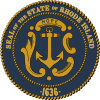Portal:Rhode Island
The Rhode Island Portal Rhode Island (/ˌroʊd-/ ⓘ ROHD) is a state in the New England region of the Northeastern United States. It borders Connecticut to its west; Massachusetts to its north and east; and the Atlantic Ocean to its south via Rhode Island Sound and Block Island Sound; and shares a small maritime border with New York, east of Long Island. Rhode Island is the smallest U.S. state by area and the seventh-least populous, with slightly fewer than 1.1 million residents as of 2020; but it has grown at every decennial count since 1790 and is the second-most densely populated state, after New Jersey. The state takes its name from the eponymous island, though nearly all its land area is on the mainland. Providence is its capital and most populous city. Native Americans lived around Narragansett Bay for thousands of years before English settlers began arriving in the early 17th century. Rhode Island was unique among the Thirteen British Colonies in having been founded by a refugee, Roger Williams, who fled religious persecution in the Massachusetts Bay Colony to establish a haven for religious liberty. He founded Providence in 1636 on land purchased from local tribes, creating the first settlement in North America with an explicitly secular government. The Colony of Rhode Island and Providence Plantations subsequently became a destination for religious and political dissenters and social outcasts, earning it the moniker "Rogue's Island". Rhode Island was the first colony to call for a Continental Congress, in 1774, and the first to renounce its allegiance to the British Crown, on May 4, 1776. After the American Revolution, during which it was heavily occupied and contested, Rhode Island became the fourth state to ratify the Articles of Confederation, on February 9, 1778. Because its citizens favored a weaker central government, it boycotted the 1787 convention that had drafted the United States Constitution, which it initially refused to ratify; it finally ratified it on May 29, 1790, the last of the original 13 states to do so. The state was officially named the State of Rhode Island and Providence Plantations since the colonial era but came to be commonly known as "Rhode Island". In November 2020, the state's voters approved an amendment to the state constitution formally dropping "and Providence Plantations" from its full name. Its official nickname is the "Ocean State", a reference to its 400 mi (640 km) of coastline and the large bays and inlets that make up about 14% of its area. (Full article...) Entries here consist of Good and Featured articles, which meet a core set of high editorial standards.
The Mount Hope Bay raids were a series of military raids conducted by British troops during the American Revolutionary War against communities on the shores of Mount Hope Bay on May 25 and 31, 1778. The towns of Bristol and Warren, Rhode Island were significantly damaged, and Freetown, Massachusetts (present-day Fall River) was also attacked, although its militia resisted British attacks more successfully. The British destroyed military defenses in the area, including supplies that had been cached by the Continental Army in anticipation of an assault on British-occupied Newport, Rhode Island. Homes as well as municipal and religious buildings were also destroyed in the raids. On May 25, 500 British and Hessian soldiers, under orders from General Sir Robert Pigot, the commander of the British garrison at Newport, Rhode Island, landed between Bristol and Warren, destroyed boats and other supplies, and plundered Bristol. Local resistance was minimal and ineffective in stopping the British activities. Six days later, 100 soldiers descended on Freetown, where less damage was done because local defenders prevented the British from crossing a bridge. (Full article...)Selected article -William Coddington (c. 1601 – 1 November 1678) was an early magistrate of the Massachusetts Bay Colony and later of the Colony of Rhode Island and Providence Plantations. He served as the judge of Portsmouth and Newport in that colony, governor of Portsmouth and Newport, deputy governor of the four-town colony, and then governor of the entire colony. Coddington was born and raised in Lincolnshire, England. He accompanied the Winthrop Fleet on its voyage to New England in 1630, becoming an early leader in Boston. There he built the first brick house and became heavily involved in the local government as an assistant magistrate, treasurer, and deputy. Coddington was a member of the Boston church under the Reverend John Cotton, and was caught up in the events of the Antinomian Controversy from 1636 to 1638. The Reverend John Wheelwright and Anne Hutchinson were banished from the Massachusetts colony, and many of their supporters were also compelled to leave. Coddington was not asked to depart, but he felt that the outcome of the controversy was unjust and decided to join many of his fellow parishioners in exile. He was the lead signer of a compact to form a Christian-based government away from Massachusetts. He was encouraged by Roger Williams to settle on the Narragansett Bay. He and other supporters of Hutchinson bought Aquidneck Island from the Narragansetts. They settled there, establishing the town of Pocasset which was later named Portsmouth. Coddington was named the first "judge" of the colony, a Biblical term for governor. A division in the leadership of the town occurred within a year, and he left with several others to establish the town of Newport at the south end of the island. (Full article...)Did you know?
Related portalsSelected picture Jerimoth Hill is the highest natural point in the U.S. state of Rhode Island, at 812 feet (247 m) above sea level. It was formerly controversial due to property complications, but it is now accessible to the public on weekends. General imagesThe following are images from various Rhode Island-related articles on Wikipedia.
TopicsSelected panoramaEaston Beach in Newport, Rhode Island
Quality content
Featured articlesFeatured listsGood articles
Featured portalsFormer featured articlesFormer featured listsFormer good articlesSubcategoriesRelated WikiProjectsThings you can do
Associated WikimediaThe following Wikimedia Foundation sister projects provide more on this subject:
Discover Wikipedia using portals |



























































